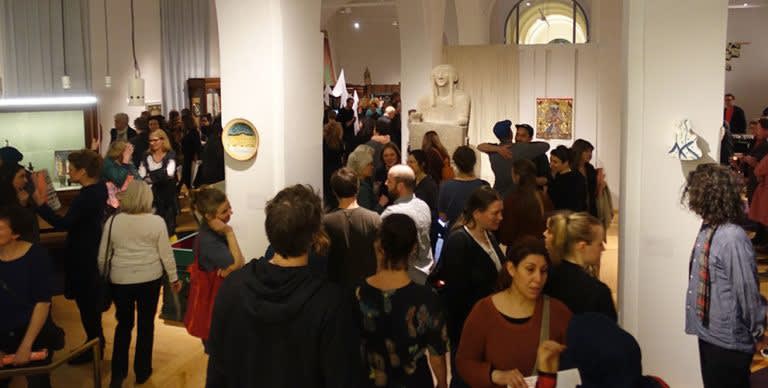
A bit under the radar and running until 14 October 2018, the exhibition Mobile Worlds or The Museum of our Transcultural Present at Hamburg’s Museums für Kunst ind Gewerbe is worth your attention. The blurb on the museum’s website reads:
The exhibition “Mobile Worlds” draws inspiration from the collection housed at the Museums für Kunst und Gewerbe in Hamburg. The MKG collection is in turn inspired by the great world exhibitions held in London, Paris and Vienna in the 19th-century. Now the world of the 19th century is passé, and with it the central position that the West has long claimed for itself. Even though our world knows many centers today, many Western museums still present themselves as though the traditional, museological division into geographies, nations, epochs, art and non-art were universally valid.
I can think of a museum or two where this indeed is still the case, so this central premise is relevant indeed. You can discover more about the show’s themes here. An interesting review in the New York Times was just published by Jason Farago; please find it here. Farago makes some excellent points:
When Europeans of the 18th and 19th centuries established their grandest museums, each building meant to unite the world’s cultural heritage under a single roof, they had no doubt as to who should explain it all: themselves. They took a Eurocentric view, categorizing the spoils of colonial enterprise by nation and region, splitting art from craft, and nature from culture.How much has really changed in this so-called postcolonial era? Apologies are made for the pillaging; diverse populations are invited to “respond.” But the museums’ old assumptions, their methods of classification and display, remain largely untroubled. How might you reorganize a universal museum for the 21st century, an age of migration and of perpetual exchange? One of the boldest answers yet is to be found in “Mobile Worlds,” at the Museum für Kunst und Gewerbe, an applied arts museum in the northern German city of Hamburg that has a similar standing to the Victoria & Albert Museum in London or the Musée des Arts Décoratifs in Paris.
And,
By and large, “Mobile Worlds” delivers on its contention that European museums need to do much more than just restitute plundered objects in their collections, important as that is. A 21st-century universal museum has to unsettle the very labels that the age of imperialism bequeathed to us: nations and races, East and West, art and craft. It’s not enough just to call for “decolonization,” a recent watchword in European museum studies; the whole fiction of cultural purity has to go, too. Any serious museum can only be a museum of our entangled past and present. The game is to not to tear down the walls, but to narrate those entanglements so that a new, global audience recognizes itself within them.
The curator Roger Buergel, best known for serving as artistic director of Documenta 12, hypothesis for a more conscionable museum is spot on. And as Farago points: “The past is hideously violent, and these institutions won’t be regenerated overnight. But history, “Mobile Worlds” reminds us, never stops moving forward — and museums won’t be reformed at all if we don’t put in the work.” The time is now!